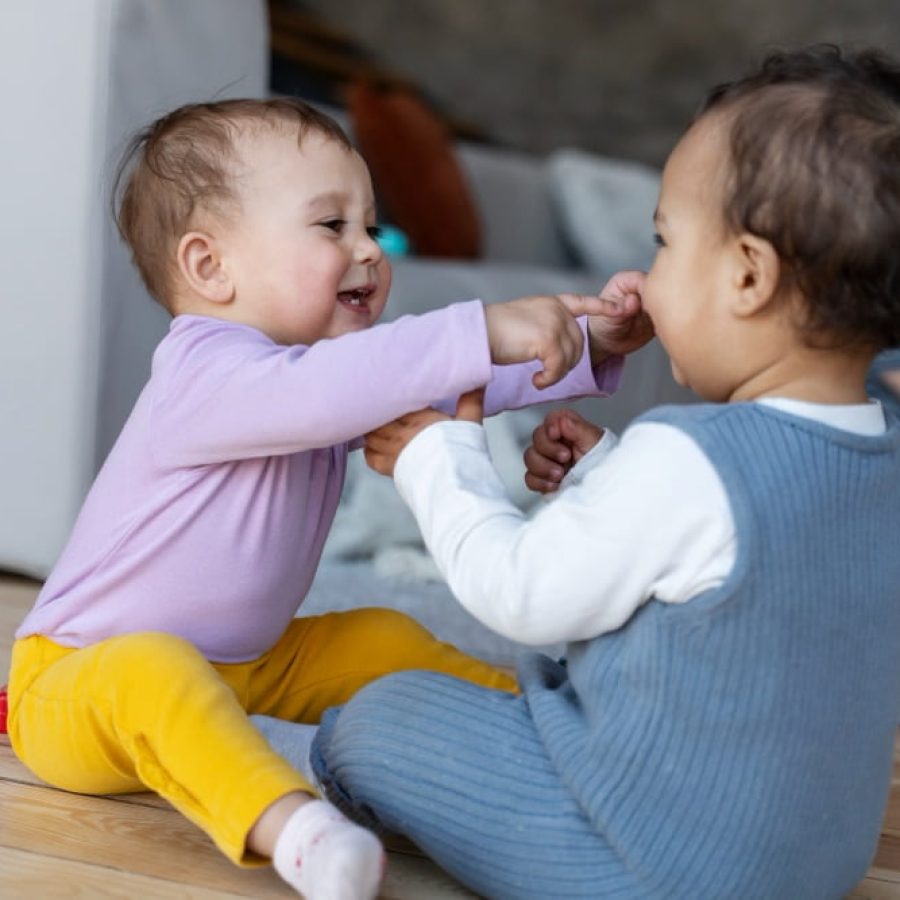As part of the child’s journey through growth, it’s important for parents, caregivers, and educators to be attentive to a child’s behavior in groups, rapidly addressing any challenges or issues that arise. This is especially true when it comes to their social development in early childhood.
Ultimately, investing in a supportive and inclusive environment for children, where they can learn and practice social skills, is essential in fostering healthy social development and preventing undesired consequences.
But what could be the impacts of these social interactions? Is there a group of people that are directly responsible for a child’s development within society? Let’s dig further into this topic.
What does social development mean?
Naturally, parents want to make sure their children are equipped from a very young age to deal with social connections. A positive set of interactions in their childhood can have a lifelong impact.
Social development in early childhood refers to the process of creating the condition so that our Little Ones are able to acquire and refine the skills, knowledge, and attitudes necessary for effective social interactions and relationships. It’s about creating a possibility for the child to navigate through different social scenarios and thrive through it.
The enhancement of these social skills encompasses a wide range of abilities, including communication, empathy, cooperation, conflict resolution, and understanding social norms and expectations.
Which factors influence social development?
Parents and caregivers play a pivotal role in encouraging and participating in children’s social development. In fact, adults that interact with the child on a daily basis can have a major impact on their social development in early childhood.
The reason for that is because these are the people that can demonstrate the value of a positive interaction. An adult’s response to a child’s interests and discoveries can influence their ability to be curious and explore.
Adults can have a direct impact on children’s social and emotional development by reacting to emotions positively. Through hard times that the child might be going through, they can collaborate for the understanding of negative emotions, hence helping children dealing with all sorts of feelings.
At the end of the day, the emotional literacy that is accumulated by a child by these interactions is also demonstrated through their relationships with peers.
How can parents encourage social development in early childhood?
Here’s how parents and caregivers act as a role model and contribute to a children’s social development.
1) Lead by example
Demonstrate effective communication by actively listening when your child talks and maintaining open and honest conversations.
Manifest empathy and kindness by showing compassion towards others, both within and outside the family.
2) Create and participate of social opportunities
Arrange playdates and group activities with other children to provide opportunities for social interaction.
You can also enroll children in extracurricular activities or clubs where they can develop interests and friendships.
3) Teach conflict resolution
Encourage your child to express their feelings and concerns calmly, and help them find constructive solutions to conflicts.
Use conflicts within the family as teachable moments to demonstrate healthy conflict resolution strategies.
4) Foster independence
Encourage your child to take age-appropriate responsibilities and make decisions, promoting self-confidence and independence in social situations.
Let them learn from their social experiences, both positive and negative, while providing support and guidance.
Why is social development important to children?
Bad experiences related to interaction with others around them can have an undesired effect on children. In fact, a child can experience trauma or other unwanted consequences of poor social development or negative social experiences.
Negative effects can vary from social anxiety, low self-esteem, academic and professional challenges due to lack of self-confidence, emotional and behavioral issues.
Fostering social development in children is not just about helping them fit into social norms; it’s about equipping them with the tools they need to thrive in all aspects of life. Parents who actively support their children in this journey contribute to their overall well-being and future success.
Hopefully, you now know how important it is to foster social development in early childhood, and how you can contribute to this ultimate outcome. On that note, are you interested in surrounding your child with the proper structure and people that are apt in helping them be their best selves? If so, we invite you to read what to consider when choosing a daycare!



